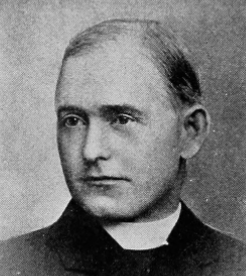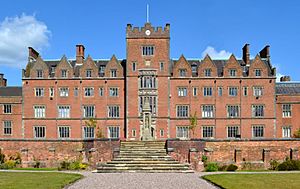William Francis Barry facts for kids
William Francis Barry (April 21, 1849 – December 15, 1930) was a British Catholic priest, teacher, and author. He was a professor of philosophy and divinity at colleges in England. Barry was also a popular writer in the early 1900s. His books often explored important religious and social topics of his time. He is known for helping to create the modern English Catholic novel.
Quick facts for kids
William Francis Barry
|
|
|---|---|
 |
|
| Born | 21 April 1849 London, England, UK |
| Died | 15 December 1930 (aged 81) Oxford, England, UK |
| Occupation | Catholic priest, theologian, educator, writer, lecturer |
| Nationality | British |
| Genre | Fiction, religious fiction, romance fiction, non-fiction, satire, essay, philosophical literature, social commentary |
Contents
Early Life and Education
William Francis Barry was born in London, England, on April 21, 1849. His parents were Irish Catholics. He went to several schools, including Hammersmith Training School and Oscott College. Later, he studied at the English College and the Gregorian University in Rome.
While in Rome, Barry was a very good student. He learned many languages, including French, German, Italian, Spanish, Gaelic, Greek, and Latin. He was even present during important historical events like the First Vatican Council in 1870.
Becoming a Priest and Teacher
In 1873, William Barry became a Catholic priest at St. John Lateran. After that, he returned to England. He started teaching philosophy and religious history at Birmingham Theological College. He also served as the college's vice president for a few years.
From 1877 to 1880, he taught divinity at his old school, Oscott College. Later, in 1883, he moved to Dorchester-on-Thames in Oxfordshire. He lived there for more than 20 years.
A Busy Writer and Lecturer
William Barry was a regular writer for several important magazines. He published about 70 essays during his lifetime. He also traveled a lot, giving talks and lectures in many parts of England and even in the United States in the 1890s.
At the start of the 1900s, Barry became a well-known author. He wrote many popular novels, especially religious and romance stories. These books often explored important social and religious ideas of his time. For example, his novel Arden Massiter (1900) was about a young English socialist in Italy. Another book, The Wizard's Knot (1901), looked at Irish culture. His last novel, The Dayspring (1903), told the story of an Irishman who traveled to France.
Later Works and Legacy
After writing novels, Barry focused on non-fiction books about religion. He wrote biographies of important religious figures like Cardinal Newman. His most famous non-fiction works include The Papal Monarchy (1902) and Heralds of Revolt (1904). He also wrote many articles for the Catholic Encyclopedia.
In 1923, Pope Pius XI honored Barry by making him a Notary Apostolic. This is a special title within the Catholic Church. Three years later, Barry wrote his own life story, called Memories and Opinions (1926).
William Francis Barry passed away in Oxford on December 15, 1930, at the age of 81. He is remembered as an important priest, teacher, and writer who helped shape Catholic literature in English.
 | Kyle Baker |
 | Joseph Yoakum |
 | Laura Wheeler Waring |
 | Henry Ossawa Tanner |


